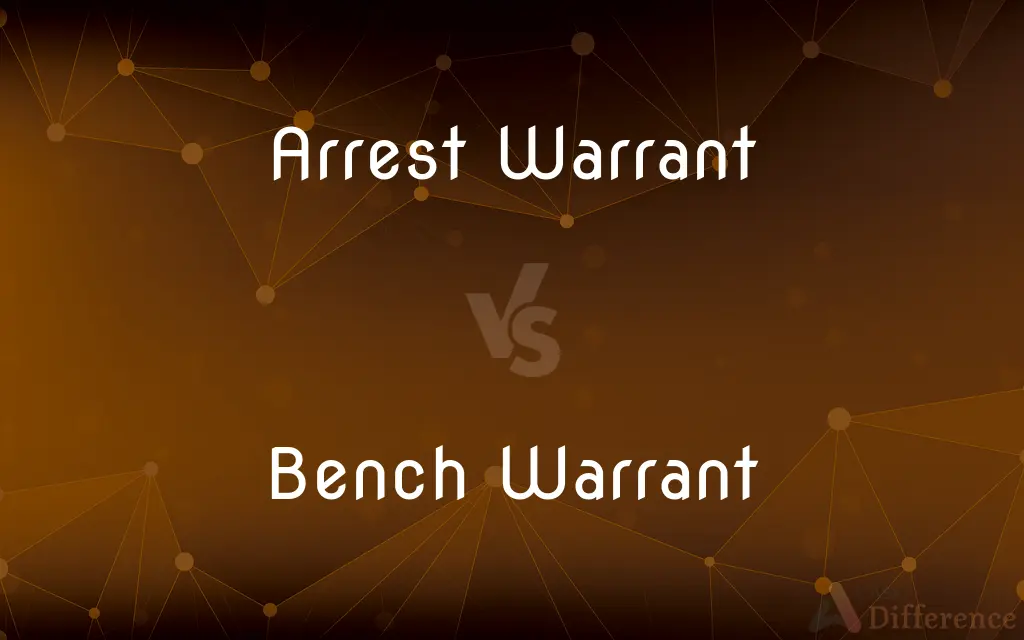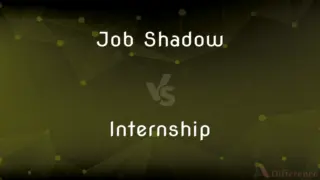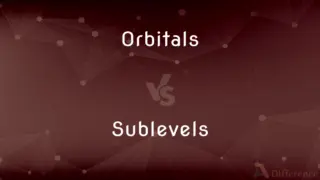Arrest Warrant vs. Bench Warrant — What's the Difference?
Edited by Tayyaba Rehman — By Fiza Rafique — Published on March 5, 2024
An arrest warrant is issued based on probable cause for a person's involvement in a crime, while a bench warrant is issued directly by a judge for failing to appear in court or comply with court orders.

Difference Between Arrest Warrant and Bench Warrant
Table of Contents
ADVERTISEMENT
Key Differences
An arrest warrant is formally issued by a judge or magistrate, authorizing law enforcement to arrest a person suspected of a crime, based on evidence presented. It is often the result of investigations and requires probable cause.
Bench warrants, on the other hand, are issued directly from the court's "bench" when an individual fails to appear for a scheduled court date, does not pay a fine, or disobeys a court order. This distinction highlights the different circumstances under which each warrant is issued.
Arrest warrants are primarily focused on initiating the legal process against someone accused of a crime, while bench warrants deal more with ensuring compliance with the judicial process. An arrest warrant can lead to the person being taken into custody for a crime, whereas a bench warrant can result in arrest due to non-compliance with court-related duties.
The process of obtaining an arrest warrant involves law enforcement presenting evidence to a judicial officer to establish probable cause. Conversely, bench warrants can be issued summarily by a judge during court proceedings or when a court mandate is ignored, without the need for a formal request from law enforcement.
Arrest warrants are usually specific about the charges and the individual involved, detailing the alleged crime. Bench warrants, however, are often issued because of a person's failure to act (e.g., not appearing in court), rather than the specifics of a criminal charge.
ADVERTISEMENT
Dealing with each type of warrant involves different procedures. Clearing an arrest warrant typically requires addressing the charges through the legal system, possibly involving arrest, booking, and a court appearance. Clearing a bench warrant might involve appearing before the court to explain the failure to comply with previous orders or to reschedule a missed court appearance.
Comparison Chart
Issued By
Judge or magistrate based on probable cause.
Judge directly for non-compliance with court orders.
Purpose
To arrest an individual suspected of a crime.
To compel appearance in court or punish for non-compliance.
Based On
Evidence of involvement in a crime.
Failure to appear in court, pay fines, or obey court orders.
Process
Requires law enforcement to present evidence.
Issued directly by a judge during or after court proceedings.
Resolution
Addressing the charges through legal proceedings.
Appearing in court to address non-compliance.
Compare with Definitions
Arrest Warrant
Initiated by law enforcement's request.
The detective applied for an arrest warrant after gathering sufficient evidence.
Bench Warrant
Issued by a judge when someone fails to appear in court.
A bench warrant was issued after John missed his court date.
Arrest Warrant
A legal document authorizing the arrest of an individual suspected of a crime.
The police executed an arrest warrant for the suspect involved in the robbery.
Bench Warrant
Can result from not paying fines or disobeying orders.
Failure to pay the court-imposed fine led to a bench warrant.
Arrest Warrant
Targets individuals for specific criminal charges.
An arrest warrant for burglary was issued against the individual.
Bench Warrant
Requires the individual to address court non-compliance.
Sarah had to clear her bench warrant by appearing in court.
Arrest Warrant
Leads to legal arrest and court proceedings.
Following the arrest warrant, the suspect was detained and awaited trial.
Bench Warrant
May lead to arrest for ensuring court order adherence.
The police arrested him under a bench warrant for ignoring court instructions.
Arrest Warrant
Issued based on probable cause and evidence.
After reviewing the evidence, the judge issued an arrest warrant.
Bench Warrant
Directly related to court process compliance.
The judge issued a bench warrant for the defendant's non-appearance.
Common Curiosities
Why would a judge issue a bench warrant?
A judge issues a bench warrant typically because a person failed to appear in court, pay fines, or follow court orders.
Can you be arrested at home with a bench warrant?
Yes, with a bench warrant, law enforcement can arrest you at home, work, or wherever they find you.
How do you get an arrest warrant?
An arrest warrant is obtained by law enforcement presenting evidence of probable cause to a judge or magistrate.
What is a bench warrant?
A bench warrant is a legal order issued by a judge for someone's arrest, usually because they failed to appear in court.
What happens if you ignore a bench warrant?
Ignoring a bench warrant can lead to arrest, additional charges, and penalties.
What is an arrest warrant?
An arrest warrant is a legal document that authorizes police to arrest a person suspected of a crime.
Are arrest warrants public record?
Yes, arrest warrants are usually public records, though access may vary by jurisdiction.
How can I find out if there is an arrest warrant for me?
You can inquire with local law enforcement or check online public record databases.
Can a bench warrant expire?
Bench warrants typically do not expire and remain active until the person appears in court or is arrested.
Can a bench warrant be issued for unpaid tickets?
Yes, a bench warrant can be issued for unpaid tickets if mandated court appearances or payments are ignored.
Is a bench warrant serious?
Yes, a bench warrant is serious as it can lead to arrest and further legal complications.
How long does it take to clear a bench warrant?
The time to clear a bench warrant varies, depending on the legal process and jurisdiction, but it generally involves appearing in court to address the issue.
What's the difference between an arrest and a bench warrant?
The main difference is that an arrest warrant is for suspected criminal activity, while a bench warrant is for failing to comply with court orders.
What should I do if I have an arrest warrant?
If you have an arrest warrant, it's advisable to contact an attorney to address the matter legally.
Can you travel with an arrest warrant?
Traveling with an arrest warrant can lead to arrest at airports or border crossings.
Share Your Discovery

Previous Comparison
Job Shadow vs. Internship
Next Comparison
Orbitals vs. SublevelsAuthor Spotlight
Written by
Fiza RafiqueFiza Rafique is a skilled content writer at AskDifference.com, where she meticulously refines and enhances written pieces. Drawing from her vast editorial expertise, Fiza ensures clarity, accuracy, and precision in every article. Passionate about language, she continually seeks to elevate the quality of content for readers worldwide.
Edited by
Tayyaba RehmanTayyaba Rehman is a distinguished writer, currently serving as a primary contributor to askdifference.com. As a researcher in semantics and etymology, Tayyaba's passion for the complexity of languages and their distinctions has found a perfect home on the platform. Tayyaba delves into the intricacies of language, distinguishing between commonly confused words and phrases, thereby providing clarity for readers worldwide.
















































